England riots: What could the police do to stop the disorder?
- Published
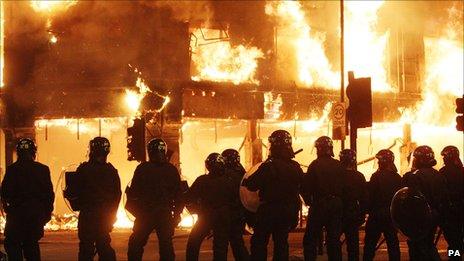
After three nights of rioting in London and outbreaks in other English cities, what methods could the police use to prevent further disorder?
Questions have been asked over whether enough was done to stop looting, arson and violence during the current disturbances.
Home Secretary Theresa May was asked whether she would consider allowing the use of water cannon, the introduction of curfews or troops being brought in to control the disorder.
She said that unlike other countries, British policing traditionally did not rely on such methods. But she said "in these circumstances" she would listen to what the police felt they needed to do the job.
As the disorder spreads to Birmingham, Liverpool and Bristol, what tactics could the police employ to stamp it out?
Water cannon
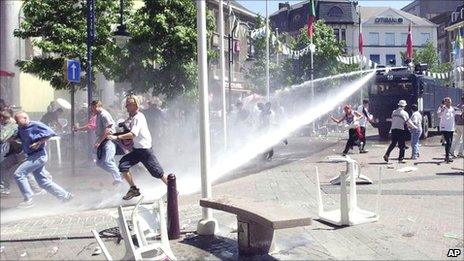
The use of water cannon is common in European countries
Water cannon which shoot a high-pressure stream of water against rioters are used in Northern Ireland as well as France, Germany and other European countries.
Conservative MP Patrick Mercer, a former army officer, called for the police to be allowed to use water cannon, saying he had used such technology and found it "extremely effective".
Dr Peter Shirlow, a human geographer and public order expert at Queen's University Belfast, agrees that such kit can be a very useful way of containing rioters who are scattered across wide open spaces by directing them into a specific area.
But he warns that, because it has never been used in Great Britain before, the authorities would risk "sending out a message that we have lost control" and inflaming tensions "in a country that has never been comfortable with the idea of militarisation".
Additionally, Peter Waddington, professor of social policy at University of Wolverhampton, who has studied policing and public order for 30 years, says getting hold of them at such short notice could be problematic.
"You don't magic water cannon out of nowhere," he adds. "There are six in Northern Ireland, but this is the marching season. I'm not sure the police there would be too keen to send them across."
Baton rounds
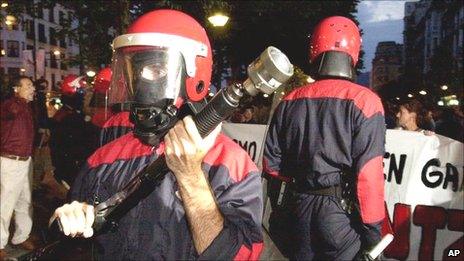
Plastic projectiles are intended to be non-lethal but can cause deaths
Weapons such as baton rounds - colloquially known as plastic or rubber bullets - have been deployed in Northern Ireland to disperse crowds and are intended as a non-lethal alternative, although they have been the cause of a number of deaths.
Such rounds can be fired from a standard firearms or special riot guns and are typically made from plastic to minimise trauma on impact.
"Baton rounds are one of the least lethal weapons available anywhere and the rest of the world uses them freely," says Prof Waddington.
"But, symbolically, to have water cannons on the streets and baton rounds looks like the end of the world."
Dr Shirlow says they can be a useful mechanism for getting rioters to scatter, at least temporarily, which gives authorities time to regroup.
But he warns that their potentially lethal character means the police would "risk losing the moral high ground" by deploying them.
Bypass police procedure
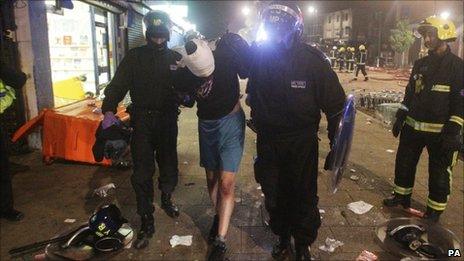
Arresting large groups of people presents a logistical problem
When a police officer arrests someone they then have a process to follow - under the Police and Criminal Evidence Act - that includes taking the individual to a police station, where among other things, the custody sergeant must be convinced that the arrest is justified.
Prof Waddington suggests that one option for the government would be to suspend elements of the act in order to free up officers and get them back on the streets.
"They deter officers [from making arrests] as you have to leave your colleagues fighting the battle when you know that the offences that they're likely to be charged with are relatively minor. You'll spend hours out of operation."
But Prof Waddington concedes that the government would be reluctant to make such a move as it would indicate "a serious state of emergency".
Curfew
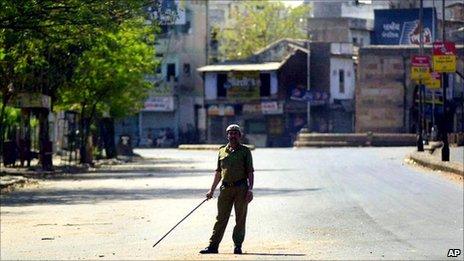
Clearing the streets using a curfew can be used as a preventative measure
Hackney MP Diane Abbot has called for a curfew to be imposed to "regain control of the streets" in affected areas.
She said: "What we can't have is increasing numbers of young people coming out to loot night after night."
However, Dr Shirlow warns that enforcing such a night-time ban on people leaving their homes would be hugely labour intensive at a time when resources are already scarce.
Additionally, he says, it would divert resources from where they are needed most - that is, tackling the disorder.
Dr Shirlow adds: "If you already have a stretched police force, how are you going to maintain a curfew?"
The Army
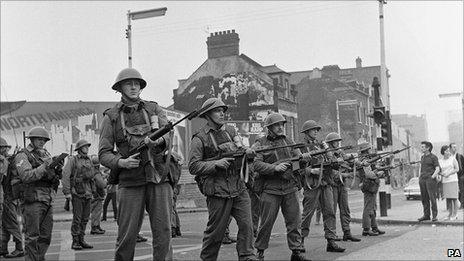
The British Army was deployed in Northern Ireland
Following serious looting and arson in the borough, Croydon council leader Mike Fisher called for the Army to be brought in.
"We need additional resources and that can be police if possible but if not then we should be looking at deployment of the Army and other military," he argued.
Dr Shirlow says that British army personnel would have experience of dealing with riot situations from their tours of places like Northern Ireland and Iraq. "In other countries they'd be deployed in the blink of an eye," he adds.
But, again, he cautions that "symbolically in Britain people have never been comfortable with the idea of militarised force on the streets" and no UK prime minister would want to be remembered as the one who broke this decades-long tradition.
And he warns that, operationally, there could be a culture clash between police officers used to dealing with civil unrest and armed forces trained for military combat.
Additionally, Prof Waddington says there would be further logistical headaches: "What are you going to equip them with? If not carrying firearms, what would they have?"